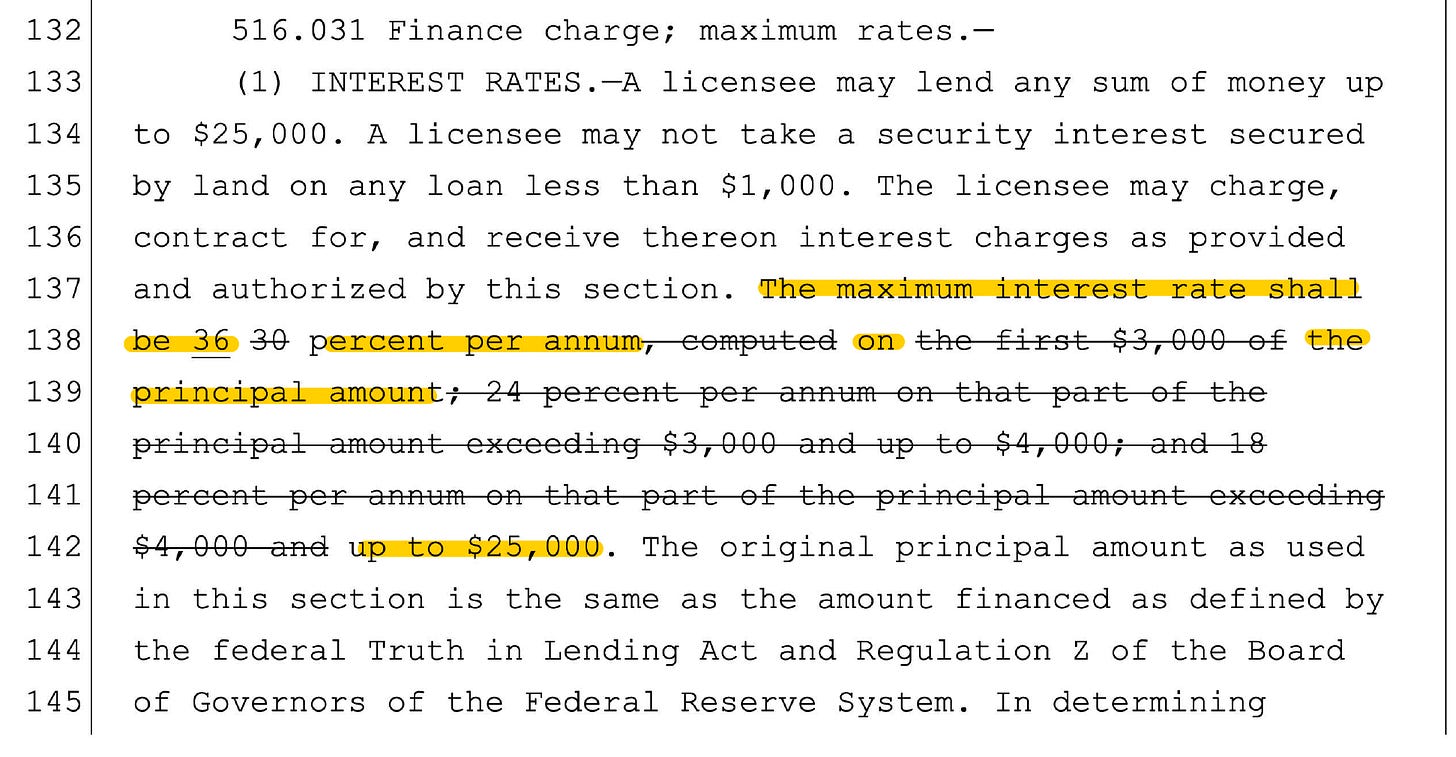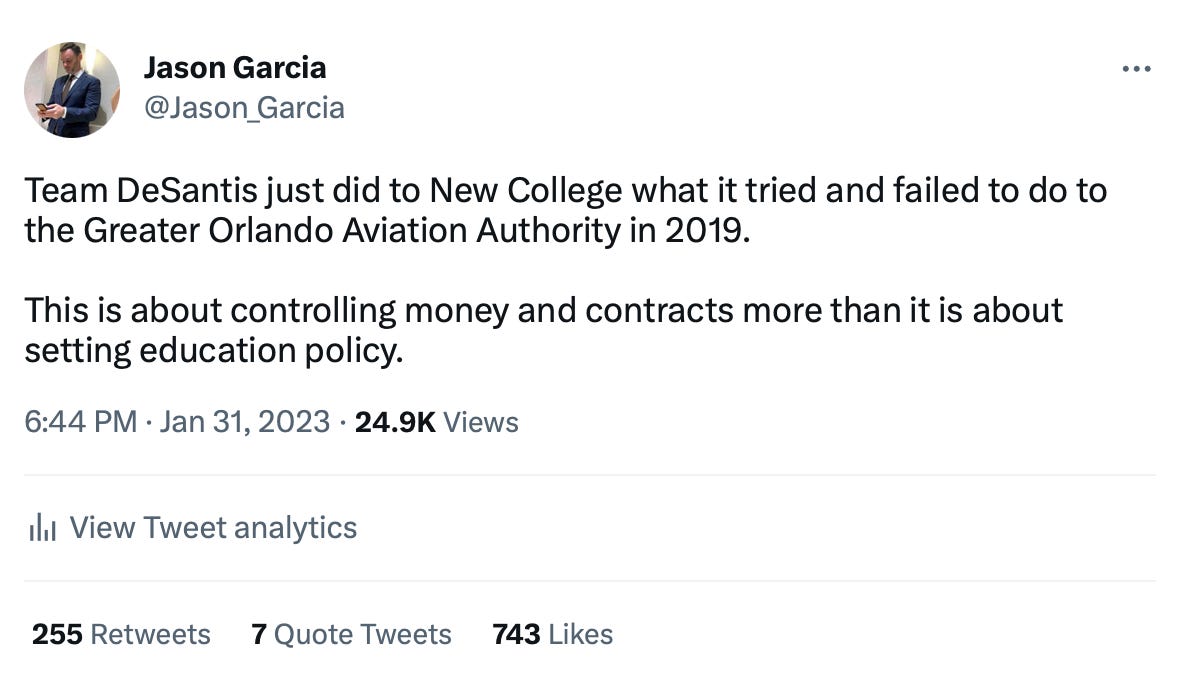Ron DeSantis and the Legislature are about to take health insurance away from hundreds of thousands of Floridians
The Trade Show (2023 ed.), Vol. 4

This is “The Trade Show,” a weekly collection of shorter news nuggets and stories from other outlets around the state and country about the special interest-driven issues that lawmakers spend most of their time working on. These are issues that ultimately have enormous impact on everyday Floridians. But they don’t get nearly enough attention outside of Tallahassee, because politicians use culture wars to distract everyone’s attention. The name comes from something a mentor once told me before I covered my very first legislative session more than 20 years ago: “Ninety percent of what goes on up here is a trade show.
The most important vote of last week’s special session came just seven minutes after lawmakers gaveled it open.
Republican leaders in Tallahassee had called the emergency session so they could give Gov. Ron DeSantis some new powers — like permission to make his migrant “relocation” program into a nationwide stunt show and the ability to squeeze the Walt Disney Co. into silence on LGBTQ+ issues.
Democrats in the state House tried to add another topic to the agenda: Health insurance. But without any substantive discussion, Republican House members quickly and casually killed a bill that would have expanded the state’s Medicaid program to cover more Floridians.
Denying healthcare coverage to Floridians is, sadly, nothing new for the state’s elected leaders.
Only four other states go further than Florida in restricting access to Medicaid. A single parent with two children can’t get coverage for themselves through Medicaid unless they make less than $7,000 a year. An adult without a child can’t get Medicaid coverage at all.
And Florida is one of just 11 states that still has not expanded Medicaid coverage under the 2010 Affordable Care Act. That keeps Medicaid coverage beyond the reach of an estimated 800,000 lower-income Floridians. More than half are people who fall into the “coverage gap,” which means they make too much money to qualify for Medicaid under Florida’s brutish rules but not enough to qualify for federal subsidies that might help them buy private health insurance.
These are working people: More than 70 percent of Floridians caught in the coverage gap are in a family with at least one worker.

But Ron DeSantis and the Florida Legislature are about to climb to another level of cruelty: They are going to take health insurance away from Floridians who already have it.
This is because of protections that the federal government enacted at the start of the COVID-19 pandemic, which forbid states from removing people from Medicaid even if those folks no longer meet the eligibility rules. Those protections are about to expire.
The DeSantis administration is expected to start kicking Floridians out of Medicaid in April. Somewhere between 900,000 and 1.75 million people — between 4 and 8 percent of the state’s population — are likely to lose their insurance. And many of them are going to fall right back into that coverage gap that the Legislature refuses to close.
This does not need to happen. The federal government is already offering the money to keep these Floridians insured. It has been for more than a decade now. But Florida’s leaders refuse to take it.
Profiting off the poor
While economic-equality activists are lobbying the Florida Legislature to extend health insurance to the working poor, a group of high-interest loan companies are lobbying lawmakers to let them make more money off the working poor.
Last week, Joe Gruters — the chairman of the Republican Party of Florida and a state senator from the Sarasota area — filed a bill that would let high-interest installment lenders like OneMain, Oportun and Mariner Finance charge their customers far higher interest rates.
This kind of high-interest consumer loans are typically marketed to low-income and credit-risky borrowers — folks who might suddenly find themselves in a financial emergency, like a broken-down car that they need to have fixed so they can get to work.
Under current law, consumer-finance lenders can charge 30 percent interest on the first $3,000 of a loan; 24 percent interest on the any amount between $3,000 and $4,000; and 18 percent on any remaining amount up to $25,000.
Gruters’ legislation would let them charge 36 percent interest on the entire $25,000.

The bill comes from a lobbying group that represents companies like OneMain, Oportun and Mariner called the Florida Financial Services Association, which records show has been handing out hefty campaign contributions over the last few months.
Since September, the organization has given $50,000 each to funds controlled by House Speaker Paul Renner (R-Palm Coast) and Senate President Kathleen Passidomo (R-Naples), $25,000 each to the Florida Democratic Party and a fund controlled by Senate Democratic Leader Lauren Book (D-Plantation), plus $10,000 each to a trio of GOP lawmakers: Sen. Ben Albritton (R-Wauchula), Sen. Jim Boyd (R-Bradenton) and Rep. Juan Fernandez-Barquin (R-Miami).
OneMain, by the way, just turned a profit of nearly $900 million.
More: High-interest lenders targeting low-income borrowers want Florida lawmakers to let them double their interest rates (Seeking Rents)
New York vs. Florida
It’s always interesting to read through earnings-call transcripts, because executives at the world’s biggest corporations speak much differently to Wall Street analysts and investors than they do customers or policymakers.
Take, for instance, Virginia-based apartment developer AvalonBay Communities Inc., which drew some questions from analysts last week after it posted surprisingly high levels of uncollectible lease revenue from tenants in two markets: New York and Florida. (Uncollectible lease revenue is rent owed by tenants who have stopped paying for whatever reason but have not yet been evicted.)
Sean Breslin, AvalonBay’s chief operating officer, described different issues with the two states during the company’s year-end earnings call last week.
Basically, New York is a place with strong tenant-protection laws that make it more difficult for landlords to force people out. Whereas Florida just has a huge number of tenants who can’t afford the rent.
“Even pre-pandemic, places like Long Island took forever to get through the court process…As you might imagine, the environment [in New York] is relatively pro resident-friendly,” Breslin said on the call.
“Obviously, [Florida is] not as kind of pro tenant-friendly as a place like New York, by any stretch,” he added. “But courts are back[ed] up, as a lot of cases that have been on the docket for months and months and it’s taking time to move things through the system…It’s a market that has had higher bad debts historically.”
Some cities and counties in Florida are trying to make the state more tenant-friendly, though.
Read: St. Petersburg City Council committee advances stronger protections for renters (Tampa Bay Times)
Barbarians at the Gate
Shortly after he took office in 2019, Florida Gov. Ron DeSantis put four people all at once on the seven-member board that runs Orlando International Airport.
The new DeSantis majority — urged on by top DeSantis advisers like political consigliere Matt Gaetz and the governor’s chief of staff — quickly launched an attempted hostile takeover of the agency, which spends hundreds of millions of dollars a year on vendors, contractors and concessionaires.
One of the first things DeSantis’ people on the board tried to do was oust the airport’s existing general counsel and replace him with their own hand-picked lawyers. During the ensuing uproar, one of the players involved in the controversy told me that there were three key positions needed to control a place like the Greater Orlando Aviation Authority: The board chair, the executive director and the general counsel.
I thought of that earlier this month during the first meeting of the new board of trustees at New College of Florida, where DeSantis had just installed six ideological allies all at once.
Within the span of about an hour, the DeSantis appointees ousted the previous board chair and replaced her with one of their own. They fired the university’s president and replaced her with Richard Corcoran, a former Republican state House speaker and DeSantis advisor. And they announced plans to replace New College’s general counsel with Bill Galvano, a former Republican state Senate president and DeSantis friend.
And now that Team DeSantis has taken total control at New College, DeSantis is asking the Legislature to give the school a lot more money to spend: Starting with an immediate $15 million infusion to recruit new faculty and students, plus other “institutional restructuring” costs.
The Legislature is expected to hand over that $15 million next week.
DeSantis and his new appointees have made a lot of noise about “recapturing” higher education and turning New College into an overtly conservative classical college. But this New College takeover is also about gaining control of money and contracts.
Read: ‘The Florida of Today is the America of Tomorrow’: Ron DeSantis’ New College Takeover is Just the Beginning of the Right’s Higher Ed Crusade (Vanity Fair)
‘Are we the baddies?’
Just another totally normal week in Florida politics where the governor of the state of Florida, who is building and weaponizing his own propaganda network, sat at a mock TV anchor desk, in front of a screen emblazoned with the word “Truth,” and claimed traditional news organizations cannot be trusted.
This calls for some British sketch comedy.
Read: DeSantis, Aiming at a Favorite Foil, Wants to Roll Back Press Freedom (New York Times)
The most powerful lobby in Tallahassee
It’s the real-estate lobby.
And the Florida Legislature might make real-estate developers even more powerful this spring, by putting Floridians at risk of paying legal fees if they lose a lawsuit trying to stop construction on undeveloped land.
Read: New bill would make it riskier to sue to protect undeveloped lands (Sun-Sentinel)
A great time to be GrayRobinson
Nice pull by one of Orlando’s television stations this week, which noticed that Gov. Ron DeSantis wants the Legislature to nearly triple his budget for attorneys and legal fees.
You can see why DeSantis might need the cash: This is a governor who has made a habit of violating the Florida and U.S. constitutions — and he’s already rung up a $17 million taxpayer-funded legal tab so far.
Read: DeSantis asks for millions of dollars more to fight lawsuits (WKMG News 6)
Last Word
We leave you this week with an outside-the-box idea from Lucy Morgan, the legendary Florida statehouse reporter, following a special session where lawmakers admitted they don’t know how Ron DeSantis is spending taxpayer money but that they approve of it anyway.
Read: ‘We could save a lot of money if we got rid of the FL House and Senate altogether’ (Florida Phoenix)








Barbarians at the Gate: One more power play by DeSantis as he asserts full authority to name the new 5-member board of the Central Florida Tourism Oversight District, formerly Disney's Reedy Creek. Can't wait to see who they are as well as their political connections. Florida's legislature continues to give our governor full backing which, in my opinion, qualifies our state as an authoritarian regime.
No stopping him now.
Voters get what they voted for.